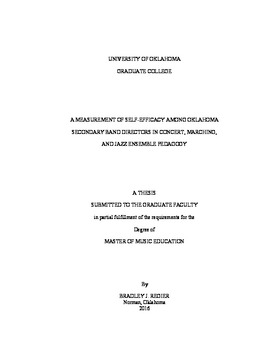| dc.description.abstract | The purpose of this study was to examine Oklahoma secondary band directors’ self-efficacy toward concert, marching, and jazz ensemble pedagogy. A secondary purpose was to investigate potential relationships between directors’ pedagogy self-efficacy (in each of the three ensemble settings) and their respective previous experiences. Oklahoma high school band directors who taught at OSSAA affiliated schools (N = 395) were invited to participate in a researcher-designed survey that included questions pertaining to their (a) school’s demographics, (b) professional teaching background, and (c) preservice music teaching experiences. Participants (N = 133, 33.7% response rate) also were asked to identify their level of agreement to items on the Band Director Pedagogy Self-Efficacy Measure (BDPSEM). Self-efficacy beliefs in concert band pedagogy were measured to be the highest of the settings, followed by marching and jazz band pedagogy respectively. Composite self-efficacy scores between ensemble settings were significantly different from one-another. These results were indicative of participant reported preservice experiences, thus supporting Bandura’s (1997) theory that self-efficacy beliefs are influenced by previous experiences. Of the four sources of self-efficacy, mastery experiences proved to have the highest correlation with self-efficacy beliefs in concert (r = .913) and marching (r = .949) pedagogy. Numerous demographic items significantly influenced band director pedagogical beliefs in more than one setting, including (a) school classification, (b) current and past inservice teaching experiences, (c) conference/workshop participation, (d) community ensemble participation, and (e) individual study.
Particular interest was given to identifying influential experiences on band director self-efficacy in jazz pedagogy, as previous studies have suggested there may be a lack of expectations and requirements in jazz settings at the undergraduate level. Nearly 70% of Oklahoma band directors reported professional experiences teaching in a jazz setting, but only 6.8% were required to participate in a jazz course during their undergraduate study. This lack of previous jazz experiences may have led to relatively low efficacious beliefs in band directors’ jazz pedagogy. Considering several jazz-related experiences were found to significantly influence Oklahoma band director beliefs in jazz pedagogy (e.g., jazz theory, improvisation, jazz pedagogy), music teacher preparation programs should be designed to afford preservice music educators various opportunities to gain pedagogical experiences that have the potential to raise efficacious jazz pedagogy beliefs. | en_US |
